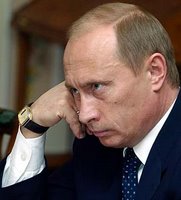 Locally, everyone in Chicago is acutely aware of the corruption and patronage that bedevils the cook county board and city council. Mayor Richard Daley is under attack for a hiring system that rewards friends and political hacks. The fight to succeed County Board President John Stoger is mired in accusations of nepotism and preferential treatment. Granted, Daley has also sold off a number of public assets (as has the Governor), leasing them back in a bit of financing wizardry that will penalize future generations, and has steered city contracts to connected firms, so we're getting the worst of both worlds.
Locally, everyone in Chicago is acutely aware of the corruption and patronage that bedevils the cook county board and city council. Mayor Richard Daley is under attack for a hiring system that rewards friends and political hacks. The fight to succeed County Board President John Stoger is mired in accusations of nepotism and preferential treatment. Granted, Daley has also sold off a number of public assets (as has the Governor), leasing them back in a bit of financing wizardry that will penalize future generations, and has steered city contracts to connected firms, so we're getting the worst of both worlds.On the national level, President Bush has pushed long and hard to privatize essential services such as healthcare. The Medicare prescription drug plan that was passed is in many ways a back door attempt to privatize public health services. So far he's been unsuccessful at changing Social Security into a private investment plan. Even duties formerly reserved for the military have been handed over to private contractors, such as Haliburton and it's subsidiaries.
 Internationally, there is a story in the Chicago Tribune today (Gas, oil fuel Russian drive for power: Kremlin sees vast stores as catapult back to influence) about the Russian attempt to re-build it's economy through its oil and natural gas resources. Vladimir Putin actually reversed the privatization of natural resources conducted under Boris Yeltsin and, using strong arm tactics that some would consider illegal, returned control back to the state. To a large extent, the maneuver has been successful, aided in no small part by the fact that oil prices have skyrocketed, and the Russian economy is growing steadily.
Internationally, there is a story in the Chicago Tribune today (Gas, oil fuel Russian drive for power: Kremlin sees vast stores as catapult back to influence) about the Russian attempt to re-build it's economy through its oil and natural gas resources. Vladimir Putin actually reversed the privatization of natural resources conducted under Boris Yeltsin and, using strong arm tactics that some would consider illegal, returned control back to the state. To a large extent, the maneuver has been successful, aided in no small part by the fact that oil prices have skyrocketed, and the Russian economy is growing steadily.What I find interesting about this debate is that in all of the cases cited above, the common result is that a priveleged few are getting fat off the process. In the case of Privatization, it's the corporate elites who benefit the most. In the case of the Russian nationalization efforts, it is the political elite who grow rich with money and influence -- basically trading the old robber barons who controlled energy companies for a new set of oligarchs. I'm sure there are some who would argue for a "trickle down" effect, but I think we all learned how well that worked back in the Reagan years.
I personally lean toward governmental bodies as the best administrators of public resources and services, because, in an ideal world, there is much more oversight, transparency and public accountability. The problem is that we don't live in an ideal society. Putin runs the Russian "democracy" as a mini dictatorship having gutted any checks on his power. I'm sure there are folks living in Chicago who could describe the fiefdoms of the city council and county board in the same way.
How do we fix this? That's the million dollar question. Voting in public officials who pay more than lip service to the concepts of open government and accountability would be a nice first step. But I think there are some greater, structural and systemic issues that need to be addressed. Is our "representative" democracy truly representative? Who wields influence and power? What chance does the whispered voice for the public interest have in competition with the bullhorn wielded by big business and the entrenched political machines.
No comments:
Post a Comment